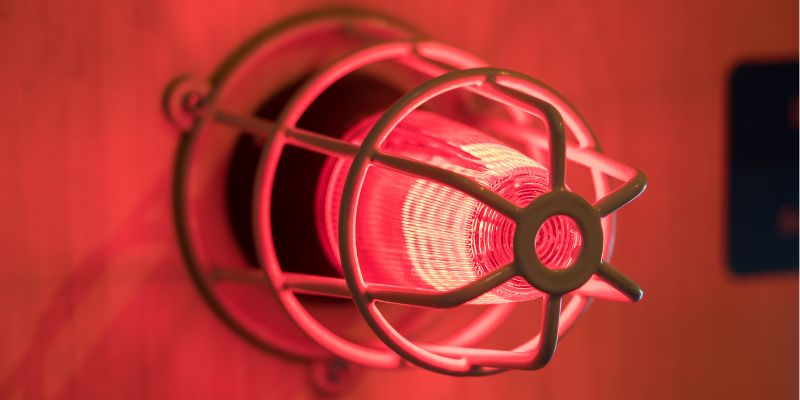Preventing false fire alarms involves a strategic mix of a well-designed alarm system, diligent maintenance, and thorough staff training. Prioritize an alarm system tailored to your premises, with sensors placed to avoid false triggers. Regular maintenance is vital to catch and rectify equipment issues early. Train your staff thoroughly on system operation and emergency response protocols through regular drills and educational sessions. These steps not only reduce disruptions and financial losses but also promote safety and efficiency. Understanding these measures in detail can greatly enhance your fire prevention strategy.
False Alarm Statistics
In England, emergency services respond to an average of 237,418 false fire alarms each year, highlighting a significant issue within fire safety management. This alarming statistic reflects notable false alarm trends, where a staggering 67% are due to apparatus issues such as faulty detectors, poor system design, or inadequate maintenance.
The cost implications of these false alarms are substantial, amounting to around £1 billion annually. Businesses bear a large portion of these costs through lost production and business disruptions. Each false alarm not only incurs direct financial costs but also disrupts operations, leading to downtime and inefficiency.
To mitigate these issues, you can implement effective prevention strategies. Start by ensuring that your fire alarm system’s design aligns with your premises’ layout and use. Regular maintenance and timely replacement of ageing components are essential in reducing false alarms. Additionally, investigating each false alarm’s cause can help you address and prevent recurrence.
Lastly, reviewing procedures and training staff on correct alarm handling can significantly minimize unnecessary activations.
Impact on Businesses
False fire alarms greatly disrupt business operations, leading to lost productivity and financial losses. When a false alarm occurs, your business faces immediate service interruptions, causing significant business disruption. Customers may lose confidence in your reliability, which can affect your brand’s reputation. The financial impact is substantial, as productivity loss translates directly into decreased revenue and increased operational challenges.
Moreover, false alarms necessitate emergency response, diverting essential resources from genuine emergencies. This not only wastes valuable time and effort but also strains emergency services, leading to inefficient resource allocation. Your business might also face higher insurance premiums due to the perceived higher risk, further compounding the financial impact.
Addressing false alarms is an essential part of risk management. Each false alarm raises safety concerns, as frequent disruptions can desensitize employees, potentially leading to inadequate responses during actual emergencies.
Implementing effective measures to prevent false alarms is vital for maintaining operational stability and ensuring the safety of everyone on your premises.
Alarm System Design
To mitigate the disruptions caused by false alarms, it’s imperative to prioritize a well-thought-out alarm system design that aligns with the specific needs of your premises. Design optimization is essential, guaranteeing that every component of your fire alarm system works efficiently and effectively.
Start by evaluating your premises compatibility; your system should be tailored to the unique layout and usage of your space. This customization reduces the risk of false triggers caused by environmental factors.
System integration is another critical element. A seamlessly integrated system allows for better communication between different components, enhancing overall reliability. Make sure that your fire alarm system is compatible with other building management systems to facilitate coordinated responses during emergencies.
Sensor placement is pivotal in minimizing false alarms. Strategically place sensors to avoid areas prone to false triggers, such as kitchens or areas with heavy machinery. Proper sensor placement ensures accurate detection and reduces unnecessary disruptions.
Lastly, keep abreast of technology advancements. Modern fire alarm systems incorporate advanced algorithms and smarter sensors that can distinguish between actual fire conditions and false triggers. Investing in the latest technology will significantly decrease the likelihood of false alarms and ensure a safer environment.
Regular Maintenance
Maintaining your fire alarm system regularly is essential to guarantee its reliability and reduce the risk of false alarms. The maintenance benefits are extensive, including preventing malfunctions that could lead to costly and disruptive false alarms.
Regular system checks ensure that all components are functioning correctly and haven’t degraded over time. This proactive approach helps you catch potential issues before they become significant problems.
Equipment servicing is another critical aspect of maintenance. By servicing your fire alarm equipment, you address wear and tear, replacing parts as needed to maintain peak performance. This can include cleaning detectors, testing batteries, and updating software. These actions contribute directly to preventing false alarms caused by faulty equipment.
Timely inspections by qualified professionals are essential for an effective maintenance program. These inspections should be scheduled according to manufacturer guidelines and any relevant safety regulations. During these inspections, technicians will perform thorough checks and diagnostics, ensuring your system complies with all standards and functions as intended.
System reliability is paramount in fire safety, and regular maintenance is your best tool to ensure it. By committing to consistent maintenance, you safeguard your premises, minimize disruptions, and maintain trust in your fire alarm system.
Staff Training
Effective staff training is essential to minimizing false fire alarms and ensuring swift, appropriate responses during actual emergencies. You need to implement thorough training programs that include role-playing exercises to simulate fire scenarios. This practice helps your team build confidence and familiarity with emergency procedures, ensuring they respond correctly under pressure.
Incorporate regular evacuation drills as part of your training regimen. These drills are vital for reinforcing the steps your staff must follow when an alarm sounds, including safe and orderly exits.
Additionally, technical knowledge about your fire alarm system should be a core component of the training. Make sure your team understands how the system operates and can identify potential issues before they escalate into false alarms.
Moreover, emphasize the importance of strong communication skills. Effective communication during an emergency can make a significant difference in the outcome. Train your staff to communicate clearly and efficiently with each other and with emergency services, if needed.
Fire Safety Tips
Building on the importance of staff training, let’s now explore some key fire safety tips to further enhance your facility’s preparedness and minimize false alarms.
Start with Alarm Testing. Regular testing guarantees that your systems are functioning correctly, identifying potential issues before they become problems. Schedule these tests routinely and document the results meticulously.
Consider Alarm Upgrades. Outdated systems are more prone to malfunctions, leading to false alarms. Upgrading your fire alarms with the latest technology reduces these risks and can improve system reliability. Additionally, upgrading can lead to Insurance Savings by demonstrating to insurers that you’re proactive about fire safety, potentially lowering your premiums.
Understanding Panel Operation is critical. Ensure your staff knows how to operate the fire alarm panel correctly, including how to silence false alarms and reset the system. This knowledge minimizes disruptions and ensures swift action during actual emergencies.
Finally, prioritize Installer Selection. Choose a reputable and certified installer to guarantee your fire alarm system is properly set up and maintained. A professional installer will provide guidance on system design and ongoing maintenance, greatly reducing the likelihood of false alarms.
Implementing these strategies will strengthen your fire safety measures and reduce the incidence of false alarms.
Call us Today
Contact us today for a FREE Survey!
0191 442 2723


